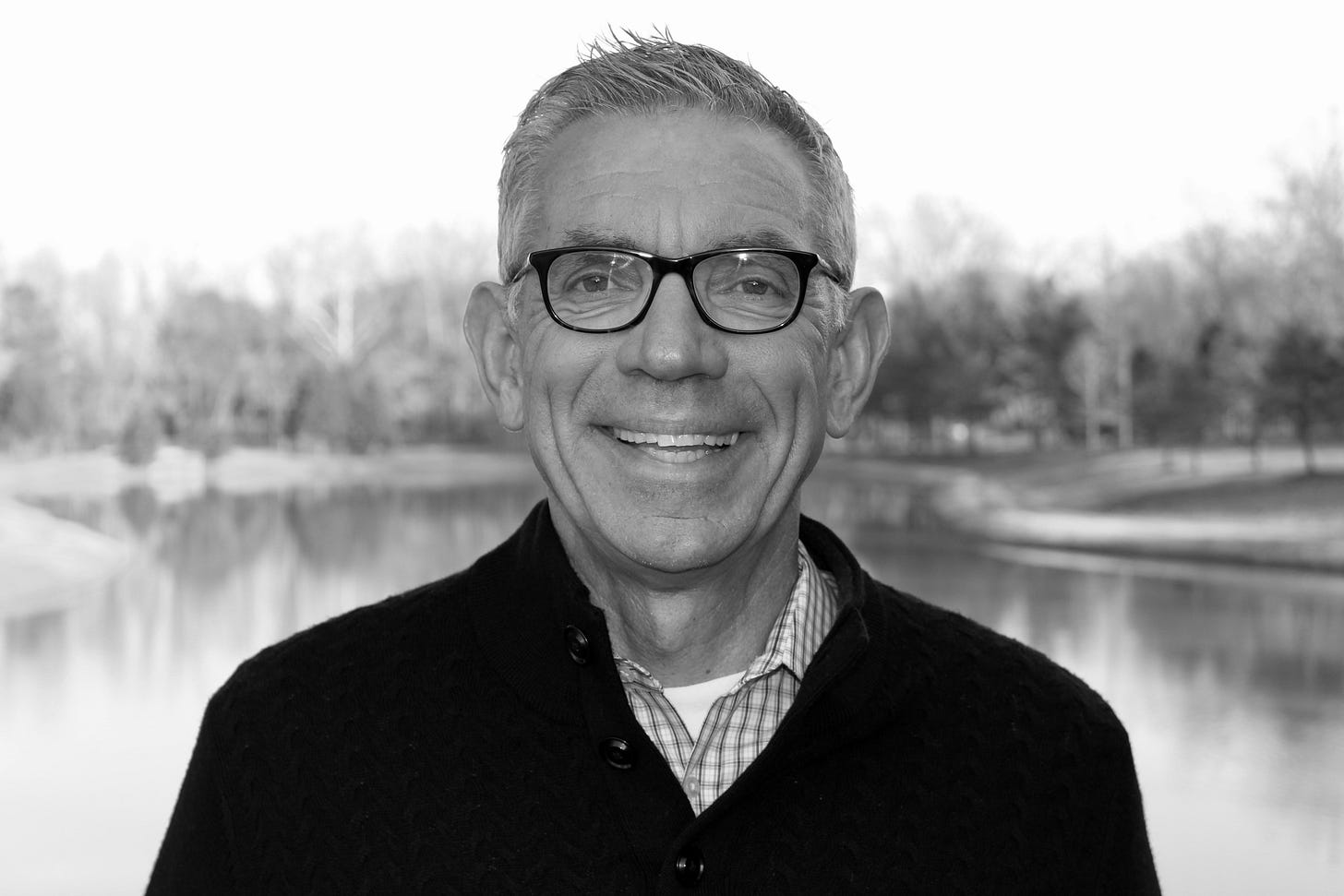Do you have more questions than answers? During this COVID-19 virus outbreak, you may feel this way as you attempt to navigate your business, your congregation, or even your life. How do you make concrete plans in this climate of fear, uncertainty, and anxiety? Perhaps you, like myself, long to experience more calmness during such a time.
Many of us are just trying to navigate life in a whirlwind of challenges. Hopefully, in some way this issue will provide encouragement and help.
Each issue offers “The List of Five.”
The List of Five
How to remain fully alive all your life
(Take away: 5 characteristics of lifelong learners)
He was a longtime New Testament professor at a Christian university. For many years he taught undergraduate Bible classes. He was always a student and a scholar who never stopped learning and growing. This day would be no exception.
As the chapel program began, a young undergraduate walked to the lectern to "make a talk." The old professor did what was his custom each day in chapel. He opened his notebook and began to take notes of the young man’s talk.
One day, a colleague asked him about this habit. The old professor explained that he wanted to learn and grow. He said "I never know when I might learn something. So I want to be ready to write it down."
What are some characteristics of people who are lifelong learners?
A. Lifelong learners intend to grow, develop, and keep on learning. Much learning is done "on purpose." We are at an advantage when we desire to learn and intend to learn.
B. Lifelong learners know that there are many, many ways to learn. For example, I have learned much from reading. I can point to a number of biographies and other books that have been important in my growth and development. We also learn from the people around us, such as friends and co-workers. These people have occasionally asked me important questions that have caused me to think about my life and the way I minister.
C. Lifelong learners are humble. It is understandable that one would be willing to learn from leading experts, top professors, and prolific authors. However, am I willing to learn from one of my peers? Am I willing to learn from one who has less experience or formal education? Am I willing to learn from someone who is younger? Am I willing to learn from one whom I have helped mentor? Humility is to acknowledge that I may know very little about a particular area of life or work and I am willing to listen. Humility means that I could be wrong about something.
D. Lifelong learners have learned and are learning. There is nothing arrogant about acknowledging that I have learned something. I have lived, thought, and studied for a number of years and I have learned a few things about life and ministry. At the same time, I continue to learn.
E. Lifelong learners maintain a healthy curiosity about life, God, and the things that matter most. So often men and women lose any sense of curiosity and settle for self-imposed ruts. On the other hand, those who remain curious are often willing to try something different. (I have noticed this in people who seem to always be growing, regardless of their age.) Perhaps I listen to music I don’t normally listen to. Maybe I watch a television program about a part of the world about which I know nothing. I might take a different route home from work just to observe what I typically do not see. At the restaurant, perhaps I could order something different than what I might typically order. Making such choices can nurture my curiosity and zest for life.

What’s Trust Got to Do With It?
(Take away: 5 qualities that build trust)
Years ago, I was teaching a Wednesday evening class at our church. The class was about to begin. A woman was still talking as I attempted to start the class. I said something about her to the group, thinking it would be funny. Everyone laughed. Well, almost everyone. She did not laugh. In fact, the next day she called me and wanted to visit for a few minutes. My words had hurt her. They brought up memories of earlier humiliations in her life. Last evening, in front of everyone, her minister had embarrassed and humiliated her. Of course, I felt awful when I realized how hurtful my actions had been. My judgement had been poor and on some level I had broken trust.
Some level of trust is important and even critical in our various relationships.
A friendship.
A business relationship (employee/employer as well as relationships with vendors, customers, client/patients and colleagues).
A marriage (note some of the trust-breakers including pornography, secret relationships with other and infidelity).
A congregation.
If you are in relationship with anyone for any length of time, people will typically come to know if you are trustworthy. They will know if you are a person who honors his/her word. They will know whether you tend to reveal what others have told you in confidence. They will know whether or not you are safe. They will know whether or not you really care. They will know.
A few observations about trust in congregations.
One preacher said to me many years ago: “Jim, if these people trust you, they will often give you the benefit of the doubt. If these people trust you, they are likely to assume the best. However, if these people don’t trust you, then it really doesn’t matter what you do. They will often assume the worst.” Trust between a minister and the elders in a congregation is critical. Trust involves another’s perception of both a minister’s intent and competency. Do they perceive that this minister’s heart is in the right place? Do they perceive that this minister is competent?
The best thing a minister can do is to be trustworthy before the elders and the congregation. After all, if the elders or the congregation cease to trust the minister, that person’s ministry with that congregation is severely damaged and perhaps has come to an end. Constant withdrawals eventually bankrupt the trust account in a ministry.
Of course, I realize that some people have unreal expectations for both a minister and the elders. Yet, trustworthiness is really not about meeting some ridiculous standard of perfection. We do ministers (and the congregations they serve) a dis-service when we put them on a pedestal. (Likewise, we ministers do no one any favor when we try to minister from a pedestal.) Yet, a congregation can appreciate, esteem, and respect their minister without putting this person on a pedestal. Ministers, however, have to take responsibility for their own trust-building behavior. Consider these important trust questions:
Can I trust this minister with my thoughts and ideas, with my spouse or with anything else that is valuable to me?
Is this minister serious about being Christ-like? Does this minister have a vibrant faith or is this just a career choice?
How large is the gap between this person’s public self and this person’s private life?
Consider these five questions that are important for most any relationship.
Do we share the same values? Do I put a premium on my own spiritual formation? Ultimately, my trustworthiness comes out of a character that is being formed and shaped by God.
Do I have genuine concern for others? Look for themes and patterns in your life that need to be addressed. For example, if the minister is passive aggressive with the elders and congregation, he probably shouldn’t be surprised if his credibility begins to erode.
Am I competent? Or, do I tend to reply on manipulation, deception, and promoting my image. (See Peter Scazzero - The Emotionally Healthy Leader)
Am I accountable? Who am I accountable to? Do I welcome this? Or, am I the person who thinks everyone else ought to be accountable but me?
Do I have integrity? What am I like online, on the phone, when I text, etc. Who am I when no one is looking?

What You and I Can Become During This Virus
(Take away: 6 positive characteristics you and I can develop during the COVID-19 virus)
Perhaps it might be helpful for us to think about the way we want to show up at home and with others (even virtually). A few possibilities.
You and I can be people of hope. Certainly, this is rooted in the story of what God has done, and is doing, in the world through Jesus. Could I be a person who communicates hope instead of despair to others?
You and I can be intentional about finding joy each day. We can look for even the smallest moments of joy. Acknowledging these to one another can bless and encourage.
You and I can communicate calmness. After all, your spouse and children will take their cues from you. Screaming and yelling will only heighten the anxiety that we already feel. This doesn’t mean that we don’t acknowledge or even absorb some of the anxiety of others. However, a calm presence can really impact a family.
You and I can be adaptable. Everything does not have to be perfect. My perfectionism doesn’t have to rule the day. (Is this really the time, in this current climate, to fuss at him/her for not yet calling the house painter?) Adaptability means that we give one another space. We hold lightly some of our expectations and preferences. Sometimes, we just have to adapt and move on.
You and I can be thankful. At a time in which the COVID-19 virus has completely disrupted our lives, choosing to be grateful for specific blessings can be huge. Yet, it is far easier to focus on scarcity and on what we are lacking.
You and I can look out for others. It is so easy to focus on oneself and how you are being inconvenienced. I have found it helpful to call friends whom I have not talked to in quite awhile. This, along with sending notes of encouragement to others, has helped me get my mind off myself.
This virus and its impact upon the world and our lives personally is huge. This is the moment to be intentional and for us to show up to others in ways that are helpful and life-giving.
“Be a non-anxious presence. Even if you zoned out during your pastoral care class in seminary, you probably heard this one phrase. That’s because showing up calm, emotionally present, and free from anxiety engenders trust and provides the right kind of care in any crisis, from papercut to pandemic. For caregivers to show up non-anxiously means managing our own feelings, so we neither try to flee the situation nor flood it with our own emotions or anxieties. People will borrow our calm and compassion to assist them in reducing their own anxieties.” (Helen R. Campbell-Reed, “10 Guidelines for Pastoral Care During the Coronavirus Outbreak,” Christian Century, March 10, 2020).
Invest in What Matters
(Take away: 5 important investments that might make a significant difference in your life.)
I was nervous. I was having lunch for the first time with a former minister whom I had recently met. He worked as an attorney in a city a few hours from where we lived. Upon arriving at his location, he suggested that we eat in his office so that we might have more time to visit. He had ordered sandwiches. For almost two hours, we talked about life, ministry, challenges, etc. I was especially interested in how he was investing his time and energy for his own growth. I learned much that day. The lunch meeting was a blessing.
For years, I have been thinking about how I can invest my attention, time, and energy so that I can stay fresh and finish well. The following are a few investments that are important to me:
Investing in my soul. Some of the disciplines I find helpful include Scripture reading, prayer, silence, journaling, reading books that nurture me, early morning time alone with God, etc.
Investing in relationships. This list would include my wife, children, grandchildren, etc. I especially want to invest in relationships that are life-giving.
Investing in emotional health. This includes being self-aware and acknowledging my emotions.
Investing in life-long learning. I am intentional about my growth which can occur by trying to maintain my curiosity about life, other people, God, the Bible, etc.
Investing in my health. Exercise and paying attention to my overall health impacts other areas of life as well.
The following video features Steve Hartman of CBS News. One way I invest in my own emotional health is by watching wonderful stories of kindness such as this video. You might consider watching some or all of these stories. For example, note the second story about a kind school bus driver in Dallas named Curtis Jenkins. A young boy in foster care said regarding this bus driver, “He’s the father I always wanted.”
Resources
You might enjoy some of Steve Hartman’s other videos, including his “Kindness 101 class” for children.
Some of you will enjoy Dr. Nathan Guy’s videos in the series “A Light in the Darkness.”
See this fine article by Helen R. Campbell-Reed, “10 Guidelines for Pastoral Care During the Coronavirus Outbreak,” Christian Century, March 10, 2020.
“The closer we feel toward someone, the less likely we are to listen carefully to them. It’s called the closeness-communication bias and, over time, it can strain, and even end, relationships.” Kate Murphy, “You’re Not Listening. Here’s Why” in The New York Times, February, 11, 2020.
Each Friday/Saturday, I post about ten tweets especially for ministers and other church leaders as they anticipate Sunday. You can find me @jimmartin.
Jim Martin serves as Vice President of Harding School of Theology, Memphis, Tennessee. You can find him at God-Hungry.org. His e-mail address is: jmartin9669@gmail.com. Feel free to write. I would love to hear what was encouraging or helpful.
















Share this post